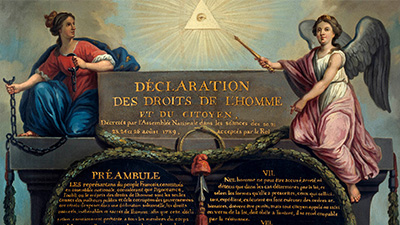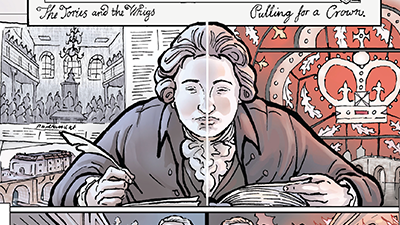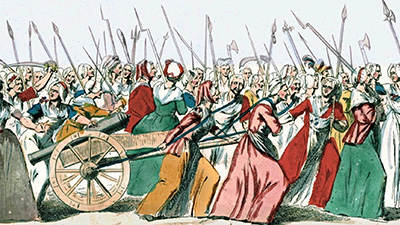Enlightenment and Revolution
Teacher Resources
Driving Question: How did Enlightenment ideas help spark revolution?
Driven by Enlightenment ideas of liberty and sovereignty, people took to the streets, demanding a role in government and an end to the rule of kings and emperors. In the Atlantic region and then beyond, revolutionaries forged a new world of nation-states.
Learning Objectives:
- Use evidence to evaluate the influence of Enlightenment ideas on political revolutions.
- Use a graphic biography to support, extend, or challenge the overarching narratives of this period.
Vocab Terms:
- autonomy
- charter
- contract
- democratic
- enslavement
- liberal
- sovereignty
Opener: Enlightenment and Revolution
To teach this lesson step, refer to page 2 of the Lesson 7.2 Teaching Guide.
Want additional ways to approach learning new words? Look no further than the OER Project Vocabulary Guide.
Revolution and evolution are two words that may look similar, but have distinctions between them that can help us evaluate the Age of Revolutions.
Revolutionary Ideas
To teach this lesson step, refer to page 3 of the Lesson 7.2 Teaching Guide.
Want tips for before-, during-, and after-reading scaffolds? Find reading strategies and more ways to support all learners in our Differentiation Guide.
Revolutions were fought with weapons, but it was the ideas behind them that gave revolutions their power. Enlightenment ideas surrounding rights and sovereignty aimed high, but as you’ll explore in these articles and activities, they had their limits.
-
Guiding Questions
-
Before you read
Preview the questions below, and then skim the article. Be sure to look at the section headings and any images.
While you read
Look for answers to these questions:
- How did Dutch and British ideas help shape Enlightenment thinking?
- What did Enlightenment thinkers believe about slavery?
- How did Enlightenment thinkers’ views on progress affect their opinions of other societies?
- In what ways did Enlightenment ideas influence production and distribution?
- How did Enlightenment thinking affect the lives of working-class people?
After you read
Respond to these questions: Do you think the Enlightenment should be called revolutionary? Why or why not?
-
Guiding Questions
-
Before you read
Preview the questions below, and then skim the article. Be sure to look at the section headings and any images.
While you read
Look for answers to these questions:
- What is sovereignty?
- How did sovereignty influence the way people thought about government?
- What does the Three-Fifths Compromise show about how sovereignty was applied?
- How did ideas about sovereignty affect some children’s lives?
- How did ideas about sovereignty change expectations for mothers?
After you read
Respond to this question: How could the idea of sovereignty help or hurt a society, depending on how it’s used?
Words of the Enlightenment
To teach this lesson step, refer to page 6 of the Lesson 7.2 Teaching Guide.
Looking for an Enlightenment Quotes Activity Extension Possibility? Take a look at these ideas in the Community Forum.
The ideas of the Enlightenment are often best analyzed through the words of those who shaped it. Compare original quotes and their modern “translations.”
Closer: Enlightenment and Revolution
To teach this lesson step, refer to page 6 of the Lesson 7.2 Teaching Guide.
Want to learn more about Enlightenment thinkers like Burke. Read Bennett Sherry’s blog, “Give me cereal, or you get death!”
The Enlightenment was full of contradictions. This activity uses the biography of one man to illustrate just how complicated these new ideas could get.
Revolutionizing Science and Technology on a Global Scale
To teach this lesson step, refer to page 7 of the Lesson 7.2 Teaching Guide.
Revolutions aren’t always about politics, explore how science was revolutionized in this era.
-
Guiding Questions
-
Before you read
Preview the questions below, and then skim the article. Be sure to look at the section headings and any images.
While you read
Look for answers to these questions:
- What evidence do we have that scientific observation and experimentation occurred before the sixteenth-century Scientific Revolution?
- How did new technologies contribute to the expansion of scientific knowledge?
- How did Islamic scholars contribute to the discoveries of the Scientific Revolution?
- In what ways did women contribute to the Scientific Revolution and how did women’s involvement in this revolution change over time?
- How might the Scientific Revolution have led to the Industrial Revolution?
After you read
Respond to the following questions: What is one example of how scientific inquiry has changed since the Scientific Revolution and what is one example of how scientific inquiry has stayed the same?
More Than Ideas: The Economic Causes
To teach this lesson step, refer to page 8 of the Lesson 7.2 Teaching Guide.
In this extension article, you’ll explore how money, labor, hunger, and inequality helped spark revolts in America, France, and Haiti, and how those revolutions were connected through global networks.
-
Guiding Questions
-
Before you read
Preview the questions below, and then skim the article. Be sure to look at the section headings and any images.
While you read
Look for answers to these questions:
- What economic and social changes came with the rise of capitalism in the late eighteenth century?
- Why did taxes and control over labor matter to people in the American colonies?
- What economic problems led to unrest in France before the French Revolution?
- What conditions in Haiti helped cause the Haitian Revolution?
- How did each revolution connect Enlightenment ideas to rights and power?
After you read
Respond to this question: What do these revolutions reveal about the role of global networks in spreading ideas and inspiring change?









